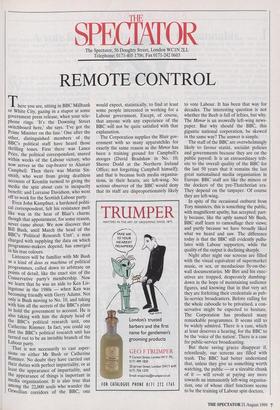SPAT mE
ECT OR
The Spectator, 56 Doughty Street, London WC1N 2LL Telephone: 0171-405 1706; Fax 0171-242 0603
REMOTE CONTROL
There you are, sitting in BBC Millbank or White City, gazing in a stupor at some government press release, when your tele- phone rings. 'It's the Downing Street switchboard here,' she says. 'I've got the Prime Minister on the line.' One after the other, distinguished members of the BBC's political staff have heard those thrilling tones. First there was Lance Price, the political correspondent, snared within weeks of the Labour victory, who now serves as the cup-bearer to Alastair Campbell. Then there was Martin Six- smith, who went from giving deathless accounts of Kremlin turmoil to giving the media the spin about cuts in incapacity benefit; and Lorraine Davidson, who went off to work for the Scottish Labour party.
Even John Kampfner, a hardened politi- cal correspondent, felt his resistance melt like wax in the heat of Blair's charm; though that appointment, for some reason, never came about. We now discover that Bill Bush, until March the head of the BBC's 'Political Research Unit', a man charged with supplying the data on which programme-makers depend, has emerged in his true colours.
Listeners will be familiar with Mr Bush as a kind of deus ex machina of political programmes, called down to arbitrate on points of detail, like the exact size of the Conservative party's membership. Now we learn that he was an aide to Ken Liv- ingstone in the 1980s — when Ken was becoming friendly with Gerry Adams. Not Only is Bush moving to No. 10, and taking with him all the secrets of the BBC's plans to hold the government to account. He is also taking with him the deputy head of the BBC's political research unit, one Catherine Rimmer. In fact, you could say that the BBC's political research unit has turned out to be an invisible branch of the Labour party. That is not necessarily to cast asper- sions on either Mr Bush or Catherine Kunmer. No doubt they have carried out their duties with perfect impartiality, or at least the appearance of impartiality, and the appearance of things is important in media organisations. It is also true that among the 22,000 souls who wander the Orwellian corridors of the BBC, one would expect, statistically, to find at least some people interested in working for a Labour government. Except, of course, that anyone with any experience of the BBC will not be quite satisfied with that explanation.
The Corporation supplies the Blair gov- ernment with so many apparatchiks for exactly the same reason as the Mirror has been a training ground for Campbell's stooges (David Bradshaw in No. 10; Sheree Dodd at the Northern Ireland Office; not forgetting Campbell himself); and that is because both media organisa- tions, in their hearts, are left-wing. No serious observer of the BBC would deny that its staff are disproportionately likely to vote Labour. It has been that way for decades. The interesting question is not whether the Beeb is full of lefties, but why. The Mirror is an avowedly left-wing news- paper. But why should the BBC, this gigantic national corporation, be skewed in the same way? The answer is simple.
The staff of the BBC are overwhelmingly likely to favour statist, socialist policies and governments because they are on the public payroll. It is an extraordinary trib- ute to the overall quality of the BBC for the last 50 years that it remains the last great nationalised media organisation in Europe. BBC staff are like the miners or the dockers of the pre-Thatcherian era. They depend on the taxpayer. Of course they are left-wing.
In spite of the occasional outburst from Tory ministers, this is something the public, with magnificent apathy, has accepted; part- ly because, like the aptly named Mr Bush, BBC staff learn to camouflage their views; and partly because we have broadly liked what we heard and saw. The difference today is that the BBC still evidently pullu- lates with Labour supporters, while the quality of the output is declining sharply.
Night after night our screens are filled with the visual equivalent of supermarket music, or sex, or mendacious fly-on-the- wall documentaries. Mr Birt and his exec- utives are trapped, desperately dumbing- down in the hope of maintaining audience figures, and knowing that in that very act they are forfeiting their credentials as pub- lic-service broadcasters. Before calling for the whole caboodle to be privatised, a con- servative might be expected to hesitate. The Corporation has produced many remarkable programmes. It seems still to be widely admired. There is a case, which at least deserves a hearing, for the BBC to be the 'voice of the nation'. There is a case for public-service broadcasting.
But these saving graces disappear if, relentlessly, our screens are filled with trash. The BBC had better understand that, unless they give us something worth watching, the public — or a sizeable chunk of it — will revolt at paying any more towards an immanently left-wing organisa- tion, one of whose chief functions seems to be the training of Labour spin doctors.


























































 Previous page
Previous page